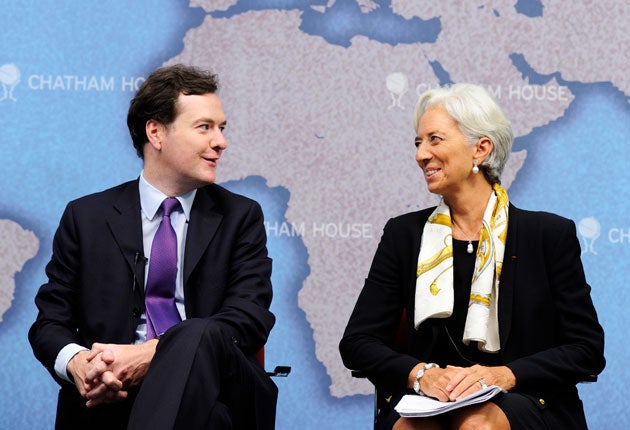IMF warns Government austerity drive may have to be slowed down

A slowdown in Britain's austerity drive will have to be considered by the Government if the country's economic growth continues to stall, the International Monetary Fund has warned.
Britain and Germany were told they may have to take a dramatic change of course if growth undershoots "current expectations". The fund underlined the precarious state of the economy as it downgraded its forecast for UK growth this year to just 1.1 per cent.
Its prediction – and the suggestion that the Chancellor could have to contemplate an economic "plan B" – provoked angry clashes between the Government and opposition and fuelled tensions within the Coalition.
The Business Secretary Vince Cable urged the Bank of England to press ahead with a new round of quantitative easing, or printing money. It also emerged that ministers believe an extra £5bn could be injected into the economy without undermining their debt reduction programme.
The IMF said the economy is set to fall far short of the Government's growth expectations, calculating that Britain will grow by just 1.1 per cent this year and 1.6 per cent in 2012. The twice-yearly IMF report, unveiled yesterday in Washington, explicitly advised the Government against cutting further. It suggests that if UK growth turns out to be even weaker than its present projections, the Chancellor should be prepared to slow the pace of deficit reduction in order to support the economy in the near term.
The IMF report said: "If activity were to undershoot current expectations, countries that face historically low yields should also consider delaying some of their planned adjustment (Germany, United Kingdom)." Ed Balls, the Shadow Chancellor, said: "These are deeply concerning forecasts for both the UK and world economy. Our Chancellor and political leaders in Europe need to wake up to the scale of the problem and finally realise that we need economic growth and more people in work to really get deficits down."
The Treasury countered that the IMF was forecasting that the UK will grow more strongly than Germany, France and the Eurozone next year.
But it added: "It is clear that the UK is not immune to what is going on in our biggest export markets, with every major economy seeing lower forecasts for growth this year and next."
Join our commenting forum
Join thought-provoking conversations, follow other Independent readers and see their replies
Comments
Bookmark popover
Removed from bookmarks